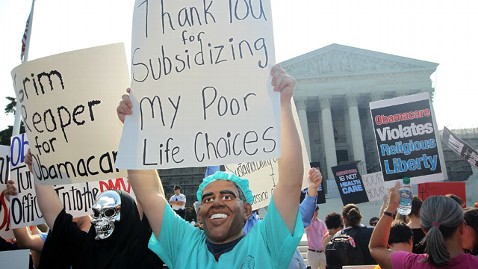'Train Wreck?': US Braces For Obamacare Unknown

Alex Wong/Getty Images
It has been a little more than three years since since Obamacare was signed into law and it is still 251 days until the majority of the law kicks in. After that, nobody really know what's going to happen. One senior Democrat recently predicted a "train wreck" unless the Obama administration does a better job explaining how things are going to work.
The one thing that everyone knows for sure is that the law is complicated. Republicans have assembled a seven-foot tower of paper to represent all of the regulations and rules that will go along with the law.
Americans' still don't really understand or like the law. But they don't want to get rid of it. Republicans no longer agree that the law should be repealed. But even Democrats are publicly nervous about what happens when the law finally takes effect and people have to buy insurance or pay a tax.
What lies at the end of the line on Jan. 1, 2014? A " train wreck" if you ask Sen. Max Baucus, a key author of the law who helped dash progressive dreams of a more liberal overhaul.
Baucus, who announced this week he would retire from the Senate in 2014, told HHS Secretary Kathleen Sebelius the administration hasn't done enough to prepare for the law or educate the public about its provisions.
Chief among those is the creation of new health care exchanges, which are supposed to offer people without employer-sponsored health insurance a menu of options. But they're over-budget, behind schedule, and fighting uncooperative governors in some states.
Nobody knows more about the exchanges than lawmakers and their staffers, who the law requires to leave the federal health care system and join the exchanges with other people on the individual market.
What's not yet clear is how the federal government will be able to continue to subsidize the health insurance of lawmakers and their staffs they way it does for other federal workers and the way most large employers do.
It is for that very reason - the subsidy - that most employees are not allowed to buy their insurance on the exchanges.
But a Politico story that suggested lawmakers are trying to weasel out of the requirement they buy health insurance on the exchanges caused a bit of a stir in Washington Thursday morning. Republicans pounced on the idea that Democrats were trying to make Americans buy health insurance they didn't want themselves.
Democrats said they were doing no such thing.
"[Senate Majority Leader Harry] Reid is committed to ensuring that all members of Congress and Congressional staff experience the benefits of the Affordable Care Act in exactly the same way as every other American," read a statement released by Reid's office. "He believes that this is the effect of the legislation as written, and that therefore no legislative fix is necessary. There are not now, have never been, nor will there ever be any discussions about exempting members of Congress or Congressional staff from Affordable Care Act provisions that apply to any employees of any other public or private employer offering health care."
Republicans have their own problems. They've been arguing since Barack Obama signed the bill into law that it should be repealed. That served them will in 2010, but not 2012, when the president cruised to reelection.
House Majority Leader Eric Cantor, R-Va., has made rebranding a priority. Part of that effort was to push an Obamacare alternative that would preserve some of the more popular provisions in the law while shelving things like the exchanges and the requirement that Americans have insurance or a pay a fee.
But conservative Republicans, like staffers for Sen. Ted Cruz, according to Buzzfeed, actively campaigned in Republican circles to defeat Cantor's bill. They want the party to stay the course and focus on repealing all of the law.
That's just what's going on in Washington. Out in the country, states and insurers predict skyrocketing rates for people buying insurance as individuals - the very people the law is supposed to help - as they begin to insure more sick people.
CareFirst Blue Cross Blue Shield, the largest insurer in Maryland, predicted this week it would need to raise rates 25 percent, on average, for individual insurance buyers because it would have to offer insurance to more people who require more care. That proposal has to be approved by the state insurance administration. Read more on that from the Baltimore Sun.